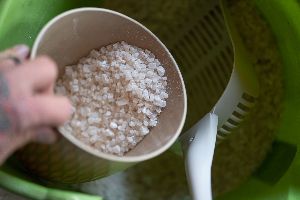
Winters in Pennsylvania often lead to plenty of snow and ice. Using rock salt is a popular method for keeping sidewalks and driveways ice-free and safer for walking and driving. Although rock salt is useful for combating slippery surfaces, it can cause problems for asphalt. Here's what you should know to protect your driveway.
How Does Rock Salt Damage Asphalt?
Rock salt is sodium chloride, which is incredibly corrosive to certain materials, including brick and asphalt. Though it effectively melts ice and snow, it will leave traces of salt behind on whatever surface you use it on and cause permanent stains.

The sodium chloride residue can seep into the porous surface and create holes and cracks. The problem will worsen when the driveway freezes and thaws during the winter.
Are There Safer Alternatives to Rock Salt?
You can safely melt ice and snow from your driveway by switching from sodium chloride to calcium chloride. It has a snow-melt limit of -25 degrees Fahrenheit, which is more effective than rock salt's 25 degrees Fahrenheit snow-melt limit, resulting in fewer freeze-thaw cycles.
Calcium chloride benefits grass and other plants around the driveway because it adds calcium to nearby soil. It's a safer alternative to rock salt on asphalt, but it can cause some streaking, so you should wash away the residue after the snow melts.
Another way to reduce your driveway's slipperiness is with fine sand. When you spread sand across your driveway, the coarse texture provides traction for your vehicle's tires and your feet. It's readily available and cost-effective. Once you apply it to your driveway or sidewalk, it will stay put and give you adequate traction in slippery conditions.
If rock salt has damaged your driveway, reach out to Lyons & Hohl Paving in East Earl, PA. Backed by 29 years of experience, this paving contractor offers residential services, including asphalt paving, repairs, resurfacing, and sealcoating. Call (717) 355-9219 to request an estimate, or visit their website to learn more about their work.
About the Business
Have a question? Ask the experts!
Send your question

